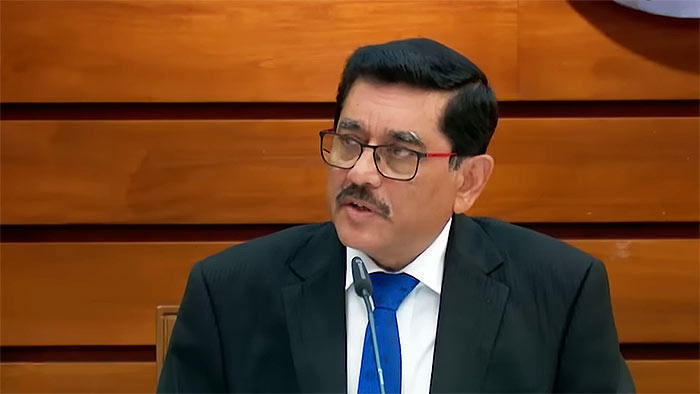Businesses with dollar income sources will only survive this crisis – Central Bank Governor

Dr. Nandalal Weerasinghe. (Photo: CBSL)
Only those who could survive this crisis are the ones who could make earnings in foreign currency, Sri Lanka’s Central Bank Governor Dr. Nandalal Weerasinghe recently said.
Speaking at a recent forum in Colombo, Dr.Weerasinghe however urged every business to transform itself to earn dollar incomes using the current crisis as an opportunity as those who earn in dollars get a better deal compared to a year ago after the rupee collapsed shedding nearly 80 percent of its value.
He said such companies could navigate the import shortages and beat domestic inflationary forces much better than those who are confined to the home market alone, earning only in rupees. “In this kind of situation, and especially in a balance of payment crisis situation, people who are engaged in foreign exchange earning sectors can only survive and do business.
This is an incentive for all the industries to focus on turning to businesses which are more competitive, foreign income operating entities. This is where the future is,” he stressed.
When the Sri Lankan economy began to feel the brunt of the foreign exchange shortage from the mid part of last year, when the then authorities bungled the economy amid dim prospects for foreign inflows during the pandemic, many enterprises with the exception of those who have at least an element of foreign income started feeling the squeeze in their operations and thereby their financial performance.
This was because they were compelled to either significantly phase down their operations or close certain business lines altogether when they could not import either the intermediate goods needed to keep their production lines running or the finished goods imports which generated them steady incomes as they found it extremely difficult to find foreign currency to open letters of credit when the dollar shortage grew out of control. Making the conditions worse in 2022, these companies were confronted with multifold increase in costs due to both runaway inflation and the sharp loss of value of the rupee against the dollar, sending their manufacturing and operational costs through the roof and thereby shrinking their margins.
This was seen from the Producer Price Index, which remained stubbornly above 100 percent during the last couple of months. However, most of such costs were passed down to the end consumer as seen from the 70 percent increase in consumer prices.
Tightening of the monetary policy aimed at squeezing demand conditions also reduced much of their incomes forcing businesses to downsize their operations. However, the dollar income earning companies showed much resilience during this period as they found little disruption in sourcing the imported materials they needed while the rupee depreciation added a sudden boost to their toplines in rupee terms, adding further strength to their financial performance.
(Courtesy: Daily Mirror)
Latest Headlines in Sri Lanka
- Sri Lankan President orders swift livelihood restoration for disaster-hit communities December 13, 2025
- Sri Lanka receives over USD 7 Billion in remittances in 2025 December 13, 2025
- Sri Lanka Parliament summoned to meet on December 18 December 13, 2025
- Sri Lanka and Italy renew agreement on mutual recognition of driving licenses December 13, 2025
- Asoka Ranwala granted bail December 12, 2025



Absolutely.
What about the Maalu paang and Kottu Rotti vending businesses?
Are they expected to charge in USD’s to survive?
Roxie,
Thank you for your wisdom.
I wonder when this mustached high-up’s will realise that the nations’s economy predominantly consists of small and medium businesses which provide services to the community at large?
That’s the class of businesses that should be cared and nurtured to re-commence economic growth.
Zimbabwe had the same financial problems like Sri Lanka and now even the small business are dealing in Dollars and it seems to work.
Dear Ranjith,
It is best that you confine your economic theories to you ‘International Toilet Cleaner’ capability.
Zimbabwe, which depends almost solely on an agricultural economy, suffered badly due to the land grabbing policies of R Mugabe. The country had hardly any foreign money inflows and as a result, it was struck badly by hyper-inflation.
China actually wrote off USD40b that was owing to them.
The hyper-inflation rendered the local currency, redundant.
SL is not in Zimbabwe’s bracket. We have seen economic resilience; we have multiple sources of foreign inflow.
Sri Lankan people, rich, poor, vulnerable, all have to learn to pay taxes and pay for housing, education, transport, energy and the rest. We cannot afford to provide ‘subsidies’. We should learn to do multiple jobs and create incomes that will support our families.
Sorry Bro Ranjith! Where you got this info. Situation in Zim has not changed!
Roxie de Abrew . Wait and see our Mr. Mugabe (self named as Hitler) will do to this country. Hope it want go down to Haiti bracket. Of course we should learn to do multiple jobs and create incomes that will support our families. Tell me how you going to do that. So far it has not worked. Please don’t tell me to grow cannabis and open few brothel And don’t show me your ignorance as well.
Mr Amarakoon. You are right there. My point when a country is corrupted to this level it is difficult to come out of it. When a country is bankrupt this level it is difficult to come out of it. But a country corrupted and bankrupt to this level it is impossible to come out of it. Zimbabwe and Haiti are good examples.